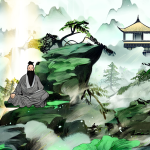《齐桓晋文之事》原文

齐宣王问曰:“齐桓、晋文之事可得闻乎?”
孟子对曰:“仲尼之徒无道桓文之事者,是以后世无传焉,臣未之闻也。无以,则王乎?”
曰:“德何如,则可以王矣?”
曰:“保民而王,莫之能御也。”
曰:“若寡人者,可以保民乎哉?”
曰:“可。”
曰:“何由知吾可也?”
曰:“臣闻之胡龁曰,王坐于堂上,有牵牛而过堂下者,王见之,曰:‘牛何之?’对曰:‘将以衅钟。’王曰:‘舍之!吾不忍其觳觫,若无罪而就死地。’对曰:‘然则废衅钟与?’曰:‘何可废也?以羊易之!’不识有诸?”
曰:“有之。”
曰:“是心足以王矣。百姓皆以王为爱也,臣固知王之不忍也。”
王曰:“然。诚有百姓者。齐国虽褊小,吾何爱一牛?即不忍其觳觫,若无罪而就死地,故以羊易之也。”
曰:“王无异于百姓之以王为爱也。以小易大,彼恶知之?王若隐其无罪而就死地,则牛羊何择焉?”
王笑曰:“是诚何心哉?我非爱其财。而易之以羊也,宜乎百姓之谓我爱也。”
曰:“无伤也,是乃仁术也,见牛未见羊也。君子之于禽兽也,见其生,不忍见其死;闻其声,不忍食其肉。是以君子远庖厨也。”
王说,曰:“诗云:‘他人有心,予忖度之。’夫子之谓也。夫我乃行之,反而求之,不得吾心。夫子言之,于我心有戚戚焉。此心之所以合于王者,何也?”
曰:“有复于王者曰:‘吾力足以举百钧,而不足以举一羽;明足以察秋毫之末,而不见舆薪。’则王许之乎?”
曰:“否。”
“今恩足以及禽兽,而功不至于百姓者,独何与?然则一羽之不举,为不用力焉;舆薪之不见,为不用明焉;百姓之不见保,为不用恩焉。故王之不王,不为也,非不能也。”
曰:“不为者与不能者之形何以异?”
曰:“挟太山以超北海,语人曰‘我不能’,是诚不能也。为长者折枝,语人曰‘我不能’,是不为也,非不能也。故王之不王,非挟太山以超北海之类也;王之不王,是折枝之类也。老吾老,以及人之老;幼吾幼,以及人之幼。天下可运于掌。诗云:‘刑于寡妻,至于兄弟,以御于家邦。’言举斯心加诸彼而已。故推恩足以保四海,不推恩无以保妻子。古之人所以大过人者,无他焉,善推其所为而已矣。今恩足以及禽兽,而功不至于百姓者,独何与?权,然后知轻重;度,然后知长短。物皆然,心为甚。王请度之!抑王兴甲兵,危士臣,构怨于诸侯,然后快于心与?”
王曰:“否。吾何快于是?将以求吾所大欲也。”
曰:“王之所大欲可得闻与?”
王笑而不言。
曰:“为肥甘不足于口与?轻暖不足于体与?抑为采色不足视于目与?声音不足听于耳与?便嬖不足使令于前与?王之诸臣皆足以供之,而王岂为是哉?”
曰:“否。吾不为是也。”
曰:“然则王之所大欲可知已。欲辟土地,朝秦楚,莅中国而抚四夷也。以若所为求若所欲,犹缘木而求鱼也。”
王曰:“若是其甚与?”
曰:“殆有甚焉。缘木求鱼,虽不得鱼,无后灾。以若所为求若所欲,尽心力而为之,后必有灾。”
曰:“可得闻与?”
曰:“邹人与楚人战,则王以为孰胜?”
曰:“楚人胜。”
曰:“然则小固不可以敌大,寡固不可以敌众,弱固不可以敌强。海内之地,方千里者九,齐集有其一。以一服八,何以异于邹敌楚哉?盖亦反其本矣。今王发政施仁,使天下仕者皆欲立于王之朝,耕者皆欲耕于王之野,商贾皆欲藏于王之市,行旅皆欲出于王之涂,天下之欲疾其君者皆欲赴愬于王。其若是,孰能御之?”
曰:“吾惛,不能进于是矣。愿夫子辅吾志,明以教我。我虽不敏,请尝试之。”
曰:“无恒产而有恒心者,惟士为能。若民,则无恒产,因无恒心。苟无恒心,放辟邪侈,无不为已。及陷于罪,然后从而刑之,是罔民也。焉有仁人在位,罔民而可为也?是故明君制民之产,必使仰足以事父母,俯足以畜妻子,乐岁终身饱,凶年免于死亡。然后驱而之善,故民之从之也轻。今也制民之产,仰不足以事父母,俯不足以畜妻子,乐岁终身苦,凶年不免于死亡。此惟救死而恐不赡,奚暇治礼义哉?王欲行之,则盍反其本矣。五亩之宅,树之以桑,五十者可以衣帛矣。鸡豚狗彘之畜,无失其时,七十者可以食肉矣。百亩之田,勿夺其时,数口之家可以无饥矣。谨庠序之教,申之以孝悌之义,颁白者不负戴于道路矣。老者衣帛食肉,黎民不饥不寒,然而不王者,未之有也。”
中文翻译
齐宣王问道:“齐桓公、晋文公(称霸)的事,可以讲给我听听吗?”
孟子回答说:“孔子的弟子中没有谈论齐桓公、晋文公称霸之事的人,所以后世没有流传。我没有听说过这事。(如果)不能不说,那么还是说说行王道的事吧!”
(齐宣王)说:“要有什么样的德行,才可以称王于天下呢?”
(孟子)说:“使人民安定才能称王,没有人可以抵御他。”
(齐宣王)说:“像我这样的人,能够安抚百姓吗?”
(孟子)说:“可以。”
(齐宣王)说:“从哪知道我可以呢?”
(孟子)说:“我听胡龁说(我从胡龁那听说):‘您坐在大殿上,有个人牵牛从殿下走过。您看见这个人,问道:‘牛(牵)到哪里去?’(那人)回答说:‘准备用它来祭钟。’您说:‘放了它!我不忍看到它那恐惧战栗的样子,这样没有罪过却走向死地。’(那人问)道:‘那么既然这样,(需要)废弃祭钟的仪式吗?’你说:‘怎么可以废除呢?用羊来换它吧!’不知道有没有这件事?”
(齐宣王)说:“有这事。”
(孟子)说:“这样的心就足以称王于天下了。百姓都认为大王吝啬(一头牛)。(但是)诚然我知道您是出于于心不忍(的缘故)。”
(齐宣王)说:“是的。的确有这样(对我误解)的百姓。齐国虽然土地狭小,我怎么至于吝啬一头牛?就是因为不忍看它那恐惧战栗的样子,就这样没有罪过却要走向死亡的地方,因此用羊去换它。”
(孟子)说:“您不要对百姓认为您是吝啬的感到奇怪。以小(的动物)换下大(的动物),他们怎么知道您的想法呢?您如果痛惜它没有罪过却要走向死亡的地方,那么牛和羊又有什么区别呢?”
齐宣王笑着说:“这究竟是一种什么想法呢?(我也说不清楚),我(的确)不是(因为)吝啬钱财才以羊换掉牛的,(这么看来)老百姓说我吝啬是理所应当的了。”
(孟子)说:“没有关系,这是体现了仁爱之道,(原因在于您)看到了牛而没看到羊。有道德的人对于飞禽走兽:看见它活着,便不忍心看它死;听到它(哀鸣)的声音,便不忍心吃它的肉。因此君子不接近厨房。”
齐宣王高兴了,说:“《诗经》说:‘别人有什么心思,我能揣测到。’说的就是先生您这样的人啊。我这样做了,回头再去想它,却想不出是为什么。先生您说的这些,对于我的心真是有所触动啊!这种心之所以符合王道的原因,是什么呢?”
(孟子)说:“(假如)有人报告大王说:‘我的力气足以举起三千斤,却不能够举起一根羽毛;(我的)眼力足以看清鸟兽秋天新生细毛的末梢,却看不到整车的柴草。’那么,大王您相信吗?”
(齐宣王)说:“不相信。”
“如今您的恩德足以推及禽兽,而老百姓却得不到您的功德,却是为什么呢?这样看来,举不起一根羽毛,是不用力气的缘故;看不见整车的柴草,是不用目力的缘故;老百姓没有受到爱护,是不肯布施恩德的缘故。所以,大王您不能以王道统一天下,是不肯干,而不是不能干。”
(齐宣王)说:“不肯干与不能干在表现上怎样区别?”
(孟子)说:“(用胳膊)挟着泰山去跳过渤海,告诉别人说:‘我做不到。’这确实是做不到。为长辈按摩,告诉别人说:‘我做不到。’这是不肯做,而不是不能做。大王所以不能统一天下,不属于(用胳膊)挟泰山去跳过渤海这一类的事;大王不能统一天下,属于对长辈按摩一类的事。尊敬自己的老人,进而推广到尊敬别人家的老人;爱护自己的孩子,进而推广到爱护别人家的孩子。(照此理去做)要统一天下如同在手掌上转动东西那么容易了。《诗经》说:‘(做国君的)给自己的妻子作好榜样,推广到兄弟,进而治理好一家一国。’──说的就是把这样的心推广到他人身上罢了。所以,推广恩德,足以安抚四海百姓;不推广恩德,连妻子儿女都安抚不了。古代圣人大大超过别人的原因,没别的,善于推广他们的好行为罢了。如今(您的)恩德足以推广到禽兽身上,老百姓却得不到您的好处,这究竟是什么原因呢?用秤称,才能知道轻重;用尺量,才能知道长短,任何事物都是如此,人心更是这样。大王,您请思量一下吧!还是说(大王)您发动战争,使将士冒生命的危险,与各诸侯国结怨,这样心里才痛快么?”
齐宣王说:“不是的,我怎么会这样做才痛快呢?我是打算用这办法求得我最想要的东西罢了。”
(孟子)说:“您最想要的东西是什么,(我)可以听听吗?”
齐宣王只是笑却不说话。
(孟子)说:“是因为肥美甘甜的食物不够吃呢?又轻又暖的衣服不够穿呢?还是因为美女不够看呢?美妙的音乐不够听呢?左右受宠爱的大臣不够用呢?(这些)您的大臣们都能充分地提供给大王,难道大王真是为了这些吗?”
(齐宣王)说:“不是,我不是为了这些。”
(孟子)说:“那么,大王所最想得到的东西便可知道了:是想开拓疆土,使秦国、楚国来朝见,统治整个中原地区,安抚四方的少数民族。(但是)以这样的做法,去谋求这样的理想,就像爬到树上却要抓鱼一样。”
齐宣王说:“真的像(你说的)这么严重吗?”
(孟子)说:“恐怕比这还严重。爬到树上去抓鱼,虽然抓不到鱼,却没有什么后祸;假使用这样的做法,去谋求这样的理想,又尽心尽力地去干,结果必然有灾祸。”
(齐宣王)说:“(这是什么道理)可以让我听听吗?”
(孟子)说:“(如果)邹国和楚国打仗,那您认为谁胜呢?”
(齐宣王)说:“楚国会胜。”
(孟子)说:“那么,小国本来不可以与大国为敌,人少的国家本来不可以与人多的国家为敌,弱国本来不可以与强国为敌。天下的土地,纵横各一千多里的(国家)有九个,齐国的土地总算起来也只有其中的一份。以一份力量去降服八份,这与邹国和楚国打仗有什么不同呢?还是回到根本上来吧。(如果)您现在发布政令施行仁政,使得天下当官的都想到您的朝廷来做官,种田的都想到您的田野来耕作,做生意的都要(把货物)存放在大王的集市上,旅行的人都想在大王的道路上出入,各国那些憎恨他们君主的人都想跑来向您申诉。如果像这样,谁还能抵挡您呢?”
齐宣王说:“我糊涂,不能懂得这个道理。希望先生您帮助我(实现)我的愿望。明确的指教我,我虽然不聪慧,请(让我)试一试。”
(孟子)说:“没有长久可以维持生活的产业而常有善心,只有有志之士才能做到,至于老百姓,没有固定的产业,因而就没有长久不变的心。如果没有长久不变的心,就会不遵守礼义法度,无所不为。等到(他们)犯了罪,随后用刑法去处罚他们,这样做是陷害人民。哪有仁爱的君主掌权,却可以做这种陷害百姓的事呢?所以英明的君主规定老百姓的产业,一定使他们上能赡养父母,下能养活妻子儿女;年成好时能丰衣足食,年成不好也不致于饿死。这样之后督促他们做好事。所以老百姓跟随国君走就容易了。如今,规定人民的产业,上不能赡养父母,下不能养活妻子儿女,好年景也总是生活在困苦之中,坏年景免不了要饿死。这样,只把自己从死亡中救出来,恐怕还不够,哪里还顾得上讲求礼义呢?大王真想施行仁政,为什么不回到根本上来呢?(给每家)五亩地的住宅,种上桑树,(那么)五十岁的人就可以穿上丝织的衣服了;鸡、小猪、狗、大猪这些家畜,不要失去(喂养繁殖的)时节,七十岁的人就可以有肉吃了;一百亩的田地,不要(因劳役)耽误了农时,八口人的家庭就可以不挨饿了;重视学校的教育,反复地用孝顺父母,尊重兄长的道理叮咛他们,头发斑白的老人便不会再背着、顶着东西在路上走了。老年人穿丝衣服吃上肉,老百姓不挨饿受冻,如果这样还不能统一天下,那是没有的(事情)。”
英文翻译
Duke Jing of Qi asked, "May I hear about the accomplishments of Duke Huan of Qi and Duke Wen of Jin?"
Mencius replied, "The disciples of Confucius did not speak of the accomplishments of Duke Huan of Qi and Duke Wen of Jin. That's why they were not handed down in later generations. I haven't heard of them either. (If) I have to speak, let's talk about benevolent governance then!"
(The Duke of Qi) said, "What kind of virtue is required to be a king over the world?"
(Mencius) said, "Make the people at peace and you will be a king. No one can stop you."
(The Duke of Qi) said, "Can I, like this, make the people at peace?"
(Mencius) said, "Yes."
(The Duke of Qi) said, "From what do you know that I can?"
(Mencius) said, "I heard from Hu He that 'Your Majesty was sitting in the grand hall when a man led an ox past the hall below. Your Majesty saw him and asked, 'Where is the ox going?' The man replied, 'It is going to be used for the inauguration ceremony of the bell.' Your Majesty said, 'Let it go! I can't bear to see its frightened and trembling appearance, as if it were going to die without any crime.' The man asked, 'Then should we abandon the inauguration ceremony of the bell?' Your Majesty said, 'How can we abandon it? Use a sheep instead!' I wonder if this is true?"
(The Duke of Qi) said, "Yes."
(Mencius) said, "Such a heart is enough to be a king over the world. The people all think that Your Majesty is stingy. (But) I indeed know that it is because Your Majesty has a compassionate heart."
(The Duke of Qi) said, "Yes. Indeed, there are such people among the common people. Although the territory of Qi is small, how can I be stingy about one ox? It is just that I can't bear to see its frightened and trembling appearance, as if it were going to die without any crime. Therefore, I used a sheep to replace it."
(Mencius) said, "Don't be surprised that the people think Your Majesty is stingy. You used a small (animal) to replace a big (one). How could they know Your Majesty's intention? If Your Majesty is pitying it for being innocent and going to die, then what's the difference between an ox and a sheep?"
The Duke of Qi smiled and said, "What kind of thought is this exactly? (I really can't explain it clearly). I'm indeed not stingy about money because of this. (It seems) the common people think I'm stingy, which is understandable."
(Mencius) said, "It doesn't matter. This reflects the way of benevolence. (The reason is that) you saw the ox but not the sheep. A virtuous person, when seeing a living creature, cannot bear to see it die; when hearing its cries, cannot bear to eat its meat. Therefore, a gentleman keeps away from the kitchen."
The Duke of Qi was pleased and said, "It is said in The Book of Songs, 'Others have thoughts in their hearts, and I can guess them.' It is about you, sir. I did this, but when I thought about it afterwards, I couldn't figure out the reason. What you said really touched my heart. What is the reason that this kind of heart conforms to the way of a king?"
(Mencius) said, "Suppose someone reports to Your Majesty, 'My strength is enough to lift a thousand jin, but not enough to lift a single feather; my eyesight is sharp enough to see the tip of a hair at the end of an autumn animal's fur, but not a cartload of firewood.' Would Your Majesty believe it?"
(The Duke of Qi) said, "No."
"Then, nowadays your benevolence is enough to reach animals, but the achievements have not reached the common people. Why is that? In this case, not being able to lift a single feather is because one doesn't use one's strength; not seeing a cartload of firewood is because one doesn't use one's eyesight; the common people are not taken care of is because Your Majesty doesn't extend your benevolence. So, the reason why Your Majesty cannot be a king over the world is not because you can't, but because you don't want to."
(The Duke of Qi) said, "What is the difference between not wanting to and not being able to in terms of their manifestations?"
(Mencius) said, "Suppose someone says to Your Majesty, 'My strength is enough to carry Mount Tai and leap over the Bohai Sea, but I can't jump over a ditch.' Would you believe it?"
(The Duke of Qi) said, "No."
"(Similarly), nowadays, the common people cannot be made to live in peace, which is like not being able to jump over a ditch. It is not that they don't have the ability, but that they don't try. Therefore, the reason why Your Majesty cannot be a king over the world is not like carrying Mount Tai and leaping over the Bohai Sea; it is like not being able to jump over a ditch. Respect your own elders and then extend this respect to the elders of others; love your own children and then extend this love to the children of others. Then you can rule the world as easily as turning things around in the palm of your hand. It is said in The Book of Songs, 'Set an example for your wife, and then extend it to your brothers, and thus govern your family and country.' It means to extend this kind of heart to others. Therefore, extending benevolence is enough to protect the four seas; not extending benevolence is not enough to protect one's wife and children. The reason why the ancient sages were far superior to ordinary people was nothing but their ability to extend their good deeds. Nowadays, your benevolence is enough to reach animals, but the common people have not received your kindness. Why is that? Use a steelyard to weigh, and then you will know the weight; use a ruler to measure, and then you will know the length. All things are like this, especially the human heart. Your Majesty, please think about it! Or do you want to mobilize troops, endanger your ministers, and create enmity with the feudal lords, and then feel satisfied in your heart?"
The Duke of Qi said, "No. How can I be satisfied with such things? I just want to get what I desire most."
(Mencius) said, "May I know what Your Majesty desires most?"
The Duke of Qi just smiled without answering.
(Mencius) said, "Is it because the delicious food is not enough for your mouth? Or the light and warm clothes are not enough for your body? Or the beautiful colors are not enough for your eyes? Or the wonderful music is not enough for your ears? Or the favored courtiers are not enough to serve you in front of you? Your ministers are all capable of providing these for Your Majesty. Could it be that Your Majesty really wants these?"
(The Duke of Qi) said, "No. I don't want these."
(Mencius) said, "Then, what Your Majesty desires most can be known. You want to expand your territory, make Qin and Chu pay homage to you, rule the Central Plains, and pacify the four barbarian tribes. To seek such an ideal with such actions is like climbing a tree to catch a fish."
The Duke of Qi said, "Is it really that serious?"
(Mencius) said, "It may be even more serious. Climbing a tree to catch a fish, although you can't catch the fish, there will be no subsequent disasters; but if you seek such an ideal with such actions and do your best, there will surely be disasters afterwards."
(The Duke of Qi) said, "May I hear about it?"
(Mencius) said, "Suppose Qi and Chu go to war. Which one do you think will win?"
(The Duke of Qi) said, "Chu will win."
(Mencius) said, "Then, a small country cannot compete with a large country, a country with few people cannot compete with a country with many people, and a weak country cannot compete with a strong country. There are nine states in the world, each with a territory of a thousand square li. The territory of Qi is only one - ninth of them. With one - ninth of the strength to subdue eight - ninths, how is it different from Qi going to war with Chu? It is better to return to the root. If you issue decrees and implement benevolent governance now, all the officials in the world will want to serve in Your Majesty's court, all the farmers will want to farm in Your Majesty's fields, all the merchants will want to store their goods in Your Majesty's markets, all the travelers will want to pass through Your Majesty's roads, and all the people who hate their rulers in the world will want to come to You to complain. If it is like this, who can stop you?"
The Duke of Qi said, "I am confused and cannot understand this principle. I hope you can help me realize my wish. Teach me clearly. Although I am not intelligent, please let me try."
(Mencius) said, "There is no fixed property to live on but always has a kind heart. Only a man of noble character can do this. As for the common people, without a fixed property, they will not have a constant heart. Without a constant heart, they will indulge in extravagance and do all kinds of bad things. When they fall into crime, then punish them with criminal law. This is to trap the people. How can a benevolent ruler in power do such a thing of trapping the people? Therefore, a wise monarch stipulates the property of the common people, making sure that they can support their parents above and raise their wives and children below; have enough to eat in good years and avoid starvation in bad years. Then urge them to do good deeds. So it is easy for the common people to follow the monarch. Nowadays, the property of the people is regulated in such a way that they cannot support their parents above or raise their wives and children below. In good years, they still live in hardship, and in bad years, they cannot avoid starvation. In this way, they can hardly save themselves from death, let alone talk about observing rituals and righteousness. If Your Majesty really wants to implement benevolent governance, why not return to the root? Provide each family with a house of fifty mu, plant mulberry trees on it, and then people over fifty can wear silk clothes; don't miss the proper time for raising chickens, pigs, dogs, and big pigs, and then people over seventy can have meat to eat; don't take away the farming time of one hundred mu of land, and then a family of several people can avoid hunger; attach importance to the education in schools, repeatedly teach them the principles of filial piety and fraternal respect, and then the old people with white hair will not carry things on their backs and heads on the road. The old people wear silk clothes and eat meat, and the common people are not hungry or cold. If it is like this and still cannot unify the world, it has never happened."
背景补充
创作背景
《齐桓晋文之事》出自《孟子·梁惠王上》。战国时期,诸侯纷争,战乱频繁,各国君主都希望通过武力征伐来实现称霸天下的目标。孟子生活在这样的时代背景下,他继承和发展了孔子的“仁”的思想,主张实行“仁政”,认为只有通过推行仁政,才能使百姓安居乐业,国家长治久安。当时齐宣王也有称霸的野心,孟子便借与齐宣王的对话,向他宣扬自己的“仁政”思想,试图说服齐宣王放弃武力征伐,转而实行仁政。
孟子的思想主张
- 仁政学说:孟子认为“仁政”是治理国家的根本原则。他强调统治者要以民为本,关心百姓的疾苦,让百姓有稳定的产业,能够安居乐业。只有这样,百姓才会拥护统治者,国家才能实现长治久安。在本文中,孟子通过举例、比喻等方式,向齐宣王阐述了实行仁政的重要性和可行性,如“老吾老,以及人之老;幼吾幼,以及人之幼”“五亩之宅,树之以桑”等,都是仁政的具体体现。
- 性善论:孟子主张人性本善,认为人天生就有“四端”,即恻隐之心、羞恶之心、辞让之心和是非之心。这“四端”是仁、义、礼、智的开端,只要加以培养和扩充,就可以成为有道德的人。在本文中,孟子认为齐宣王“以羊易牛”是因为有不忍之心,这就是“仁”的萌芽,只要将这种“仁”之心推广开来,就可以实现仁政。
- 民本思想:孟子非常重视百姓的作用,提出了“民为贵,社稷次之,君为轻”的著名论断。他认为百姓是国家的基础,统治者应该以百姓的利益为重,只有得到百姓的支持和拥护,国家才能稳固。在本文中,孟子通过分析齐宣王的“大欲”,指出如果不实行仁政,即使拥有强大的武力,也难以实现称霸的目标,因为百姓才是国家的根本。
文学价值
- 高超的论辩艺术:本文体现了孟子高超的论辩技巧。他善于运用比喻、举例、设问等多种手法,使抽象的道理变得具体形象,易于理解。例如,用“缘木求鱼”来比喻齐宣王以武力称霸的做法是行不通的;用“邹人与楚人战”来说明小国不能与大国的道理等。同时,他还善于抓住对方的心理,因势利导,层层深入地进行论证,使对方不得不接受自己的观点。
- 生动的语言风格:孟子的语言生动形象,富有感染力。他善于运用排比、对偶等修辞手法,使文章气势磅礴,节奏明快。例如,“乐岁终身饱,凶年免于死亡”“谨庠序之教,申之以孝悌之义,颁白者不负戴于道路矣”等语句,读起来朗朗上口,富有节奏感。此外,他的语言还富有情感色彩,能够打动读者的心灵,引起读者的共鸣。












评论功能已关闭。